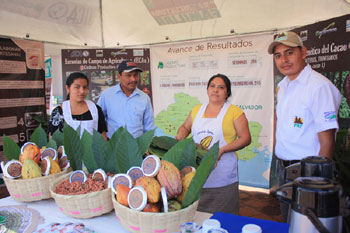National authorities and authorities from IICA met with beneficiaries of the largest program in El Salvador in support of agriculture.

Izalco, Sonsonate, El Salvador, July 19, 2012. (IICA). A year after the launch of the PAF-Production Chains Program, within the framework of the Family Agriculture Plan (PAF), the positive changes that have taken place in agriculture and in producers in El Salvador are evident.
To date, more than 13,000 families have benefited from this program, providing them with technical assistance through the Field Schools (ECAS) and the Training of Enterpreneurs (CEFE) methodologies, which have trained more than 1,500 producers through an investment of US$12.4 million.
During a meeting held to present the results achieved by the PAF in a little over a year, Guillermo Lopez Suarez, Minister of Agriculture and Livestock Farming of El Salvador, stated that “A new type of agriculture, based on production chains, has been developed thanks to the dedication and efforts of producers themselves. The PAF-Production Chains Program was created for them and has grown as a result of their hard work.”
At present, technical and extension personnel of the PAF MAG/CENTA/IICA are using state-of-the-art technologies such as Internet, USB, GPS, computers, cameras, cell phones and other devices in their work. Two groups of young people with degrees in Agronomy from the Roberto Ordoñez National Agriculture School (ENA) have joined in the field work.
More than US$6 million have been provided as an incentive to apply technological innovations, accompanied by specialized technical assistance.
Through the 30 Collection and Service Centers (CAS) established in El Salvador, the producers have learned how to more efficiently organize their purchases of the inputs they need for production.
A model to replicate
“The PAF-Production Chains Program is a very important project for our Institute, not only because of the positive impact it is having in the country, but also because it is a model worth replicating in other countries facing similar problems,” said Victor M. Villalobos, Director General of IICA.
At the meeting with the minister and the beneficiaries of the PAF, he encouraged producers to bring all their intelligence, knowledge and wisdom to bear in facing climate change with the best possible tools,. He also asked them to strive to make agriculture more productive (which will increase yields), as well as more sustainable and inclusive so that even the smallest farmer can contribute to food security.
Villalobos added “The chains approach being promoted by the PAF-Production Chains Program in this country enables producers to add value to their products, the goal being for them to be not merely suppliers of raw materials, but also to partake in the benefits.”
The IICA Representative in El Salvador, Gerardo Escudero, referred to the progress reported by the program as historical, considering that thousands of beneficiaries are learning and applying the technical know-how they acquired in the 4,400 sessions held at the ECAS throughout the country, and engaging in marketing and business development activities.
According to Escudero, “It is moving to see firsthand results such as increased production and productivity, better and closer relations with formal private and institutional markets, greater access to loans and investment projects, and more effective management of organizations and associations.”
Escudero thanked the Ministry of Agriculture and Livestock Farming, the National Agricultural and Forestry Technology Center (CENTA) and the ENA for the leadership and resolve they have shown as facilitators of and contributors to the innovative process of implementing the PAF-Production Chains Program, the goal of which is sustainability in the long term.
More support for the PAF
The United States is a major contributor to the PAF, providing US$7.8 million for five projects. The largest, in terms of amount and strategic importance, is “Strengthening the Family Agriculture Plan and the Development of the Fruit, Cacao and Vegetable Chains,” valued at US$5.3 million.
Thirty-seven organizations of the different production chains benefited from a contribution of US$1.1 for investment and developing businesses. The funds, derived from loans signed between the government of El Salvador and the International Fund for Agricultural Development (IFAD), will benefit some 5,000 families in eight Departments around the country.
Minister Lopez, Deputy Minister Hugo Flores, the U.S. Ambassador in El Salvador Mari Carmen Aponte, the Director General of IICA and the IICA Representative in the country, among other authorities, participated in a meeting attended by some 3,500 producers of the 10 chains declared priorities by the PAF-Production Chains Program, where the most important results were presented.
The Family Agriculture Plan (PAF), a major effort on the part of the State to rescue the agricultural sector, is gradually improving agriculture in El Salvador by supporting producers and helping to increase the net income of families by making rural enterprises more competitive and promoting the creation of agricultural production chains.
For more information, contact:
gerardo.escudero@iica.int
Photo gallery: Results of the PAF-Production Chains Program in El Salvador











